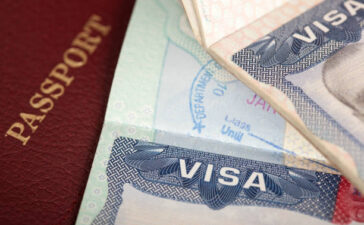If you’ve recently had a USA visa refusal, you may be wondering how to appeal. Read on to learn about the top 4 reasons for visa refusal and how to appeal them. Here are a few tips. Always answer all questions honestly. Explain your purpose of travel and why you’d like to return home. Make sure you use your visa correctly and properly explain your intention to come to the United States. Immigration officers must abide by U.S. immigration law, so they cannot deny you a visa based on a question or comment.
Advertisement
214(b) ground for refusal
The 214(b) ground for USA visa rejection can be particularly frustrating. The consular officer may consider a document fraudulent and deem it not appropriate for entry to the country. However, this officer may not have the resources to investigate this case. In these cases, the consular officer may refuse your application based on 214(b) or 212(a)(6)(C)(i).
The consular officer may be suspicious of your intentions to stay in the country, but if you can convince him otherwise, he may grant you a visa anyway. In such cases, you must explain your intentions and the circumstances of your trip to the consular officer. These ties can include family, employment, or other connections. The consular officer may also be suspicious of your intentions to remain in the country permanently.
Administrative processing
What are some common reasons for Administrative Processing for USA visa refusal? Most visa refusals are related to criminal records. If you are convicted of a crime, the government may request that you take a Security Advisory Opinion. Additionally, your country may use child soldiers. These reasons are just some of the many reasons why you may be refused a visa. Nonetheless, if these reasons are the main reason for your USA visa refusal, there are some things you can do to improve your chances of getting approved.
The United States Department of State (USCIS) uses Security Advisory Opinion, or SAO, to evaluate foreign applicants for admission to the United States. It involves the Department of State headquarters in Washington, D.C., and other government agencies. The government requires this process for individuals who have “sensitive/critical” job functions or who might use classified or unethical technology. Applicants who are found to be involved in such situations may face a variety of delays in their application.
Fraud
The first thing you need to know about USA Visa Refusal is what is the basis of the rejection. There are a variety of reasons for refusal. If you are applying on behalf of someone else, it is important to be truthful about your background. Fraud is a serious offense and will result in an inadmissibility determination. You may be able to appeal, but only if you have sufficient evidence to support your claim.
Advertisement
Applicants who are forgetful or unable to follow instructions may face delays in processing their visa application. The consul may question the qualifications of a university if they think the applicant has faked academic credentials or failed to submit all of the required documents. For example, a visa consultant who has been compensated for his work might supply fake academic credentials or doctored bank statements. These documents may be a reason for a 214(b) refusal, or a 212(a)(6)Ci permanent bar. The consul will assume that the applicant knows that the documents are fake.
Inadmissibility
Whether you are traveling to the USA for work or pleasure, there are several reasons that your application was denied. Inadmissibility can be temporary or permanent, depending on the reason for the visa refusal. Temporary inadmissibility can be overcome, but permanent inadmissibility cannot be overcome. In such cases, a motion for reconsideration should be filed.
Your criminal history is another reason for inadmissibility. This could include crimes of moral turpitude, simple possession of less than 30 grams of marijuana, and involvement in Nazi persecutions. In most cases, you will be denied admission if you have a criminal past, but if you meet certain requirements, you may be able to apply for a nonimmigrant waiver. However, you should be aware that this appeal process can take several months.




